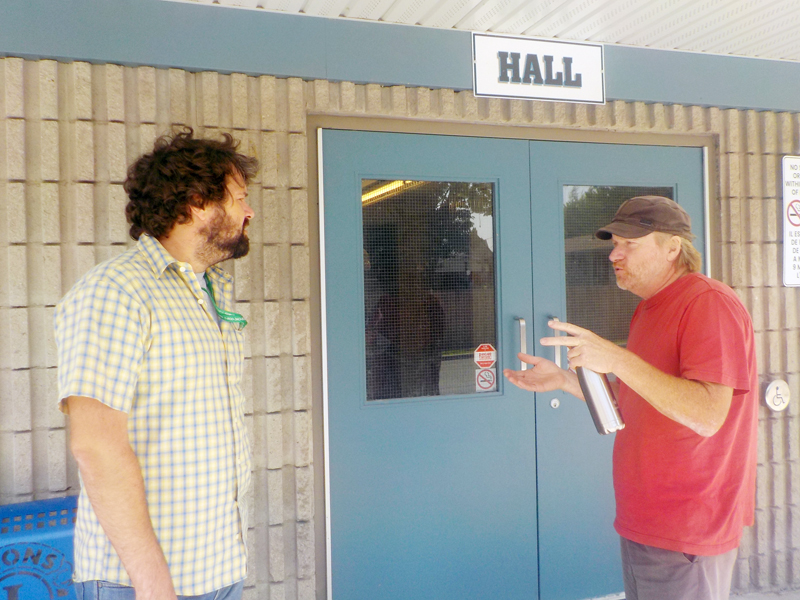Hot topics
Philippe Thomas (left) and Ian Reveler talk strategy outside North Stormont Community Hall in Finch during the Nation Rise Wind Project review tribunal hearing. Van Dusen photo
Tom Van Dusen
Record Contributor
FINCH – Chesterville resident Philippe Thomas educated the panel on barotrauma effecting bats when he took to the stand Monday during the second week of the Environmental Review Tribunal Hearing into the Nation Rise Wind Power project approved for North Stormont.
Accepted by the hearing as an expert witness on wildlife biology, federal government employee Thomas described how the phenomenon can cause the lungs of bats to implode when they fly in low-pressure areas close to wind turbine blades such as the ones EDP Renewables Canada plans to install in 33 locations.
He told of a study in which he took part, in western Canada where it was his job to pick up bat carcasses at the base of turbines; he collected more than 400, only a few of which displayed injuries consistent with being struck by blades; the remainder would have succumbed to barotrauma.
Thomas told panel chair Maureen Carter-Whitney he saw no evidence in reviewing EDP documentation that the project proponent has considered the impact of barotrauma. While a little more attention has been paid to the effect on migratory birds, the expert remained unconvinced it was enough. Comparatively few birds are lost due to direct turbine hits; however flocks suffer because the presence of windmills alters their flight and nesting patterns, and habitat.
Held at North Stormont Community Hall in Finch, the hearing broke after only two hours Monday, with plans to reconvene Tuesday and continue through Friday. Participants were surprised when eastern Ontario bat whizz Dr. Brian Hickey, who was expected to give evidence, withdrew as a witness on grounds of having a conflict.
Headed by local resident Margaret Benke, opponents had been hopeful the new Doug Ford government would cancel Nation Rise just as it did the White Pines wind project in Prince Edward County and, closer to home, Eastern Fields Wind Project in La Nation and in Champlain Township. But because Nation Rise had met its “development milestones”, opponents are left with hearing legal bills and other expenses closing in on $20,000.
Among witnesses heard in Week One was Jane Wilson, volunteer president of Wind Concerns Ontario, who blasted the provincial approach to monitoring industrial turbines, accusing it of ignoring complaints about noise, health and other issues, or deferring them with no subsequent action.
A registered nurse, Wilson said Wind Concerns represents a coalition of more than 30 community groups across Ontario. She emphasized that the Ministry of Environment and Climate Change – renamed under Ford the Ministry of Environment, Conservation and Parks – has always pledged to protect the environment and human health from any turbine side effects.
She cited former Environment Minister Glen Murray, congratulating his officials for responding quickly to complaints and enforcing the law. However, Wilson’s review of incident reports obtained through Access to Information indicated the ministry doesn’t respond to all complaints and “does not, therefore, enforce the law.”
Total number of incident reports filed with the ministry between 2006 and 2016 was 4,574, Wilson told Carter-Whitney. Records showed that, in more than 50 per cent of formal complaints, there was no ministry response. Another 30 per cent were deferred. “In fact, only one per cent of reports received priority response.”
“Documented health effects include headache, sleep deprivation, annoyance, and ringing or pressure sensation in the head and ears. Most disturbing was the fact these health effects were reported many times, and also among children.” Wilson indicated that 39 per cent of 2006-16 incident reports referred explicitly to sleep disturbance which is generally blamed for a myriad of diseases and disorders.
“Given the thousands of unresolved noise complaints in Ontario, and given Health Canada results of adverse health effects at distances of 550 metres to one kilometre, it’s reasonable to question whether the Nation Rise Power Project will not also engender community reports of excessive noise and adverse effects.”
The local complaints are, in fact, legion and are what led to the hearing. Resident Sylvie Renaud, a retired RCMP member with horses, told the panel about her chronic tinnitus brought on by cancer treatment which she has discovered – by visiting a nearby wind farm – is exacerbated by turbine noise.
Maureen Grady, who married into a local dairy farming family, said genetic medical conditions suffered by her two sons would worsen if turbines are installed one to three kilometres from her home as now planned. She took issue with the EDP medical expert who brushed aside her concerns.
In giving its evidence, EDP has insisted sensors, alarms, a predictive diagnostics team, and the ability to shut down turbines if necessary will guarantee safety to neighbours. The company’s expert medical witness Dr. Robert McCunney insisted there’s no scientific evidence to back fears of potential harm to human health.











